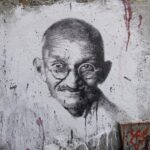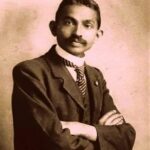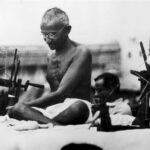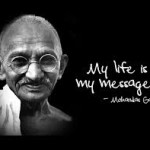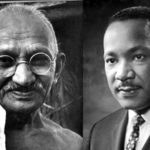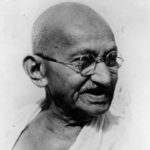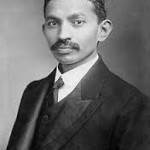Articles by Gandhi
We found 42 results.
The Road to the Culture of Nonviolence
Dr. R. Vetrickarthick | The Gandhigram Rural Institute – TRANSCEND Media Service,
12 May 2025
Brutal Physical Strength or Determined Mental Strength or Spirited Soul Force – Which is the strong one?
→ read full articleThe Jews in Palestine
Mahatma Gandhi | The Harijan – TRANSCEND Media Service,
1 Jul 2024
26 Nov 1938 – “And now a word to the Jews in Palestine. I have no doubt that they are going about it in the wrong way. The Palestine of the Biblical conception is not a geographical tract. It is in their hearts. But if they must look to the Palestine of geography as their national home, it is wrong to enter it under the shadow of the British gun. A religious act cannot be performed with the aid of the bayonet or the bomb. They can settle in Palestine only by the goodwill of the Arabs. They should seek to convert the Arab heart.”
→ read full article(Italiano) Questione arabo-ebraica in Palestina
M. K. Gandhi | Centro Studi Sereno Regis - TRANSCEND Media Service,
16 Oct 2023
10 Ottobre 2023 – Un articolo che Gandhi scrisse per il giornale «The Harijan» e pubblicato il 26 novembre 1938, quanto mai attuale in questi giorni e quanto mai non compreso, allora, purtroppo.
→ read full articleFather of the Nation: Mahatma Gandhi’s Granddaughter Remembers Her Heroic Ancestor on the Anniversary of His Birth
Tara Gandhi-Bhattacharjee | RT - TRANSCEND Media Service,
2 Oct 2023
2 Oct 2023 – Gandhi’s desire for harmony with nature and the environment remains significant with the current focus on climate action and sustainability.
→ read full articleThe Three Kinds of Violence Defined by Prof. Johan Galtung
Gandhi Nonviolence – TRANSCEND Media Service,
14 Feb 2022
The word “violence” is typically used to describe harmful actions inflicted upon one person by another, but Galtung suggests that the the concept of “violence” actually denotes a much broader range of actions and behaviors. This video defines and differentiates the three types: “Direct Violence” – “Structural Violence” – “Cultural Violence”
→ read full article“You must not lose faith in humanity. Humanity is an ocean; if a few drops of the ocean are dirty, the ocean does not become dirty.”
Mahatma Gandhi - TRANSCEND Media Service,
8 Nov 2021
Mohandas Karamchand Gandhi was an Indian lawyer, anti-colonial nationalist and political ethicist who employed nonviolent resistance to lead the successful campaign for India’s independence from British rule and in turn to inspire movements for civil rights and freedom across the world.
→ read full articleResisting the Corrosive Power of Consumerism — A Conversation with Ela Gandhi (Podcast)
Ela Gandhi | Nonviolence Radio - TRANSCEND Media Service,
27 Sep 2021
16 Sep 2021 – The granddaughter of Mahatma Gandhi discusses growing up in her family’s intentional community and the importance of self-sufficiency.
→ read full articlePrinciples of Nonviolence
Gandhi & Luther King – TRANSCEND Media Service,
22 Feb 2021
Principles Are Guidelines, Not Laws
→ read full article“There is no way to peace. Peace is the way.”
Mahatma Gandhi – TRANSCEND Media Service,
8 Feb 2021
Mohandas Karamchand Gandhi was an Indian lawyer, anti-colonial nationalist and political ethicist who employed nonviolent resistance to lead the successful campaign for India’s independence from British rule and in turn inspired movements for civil rights and freedom across the world.
→ read full articleFacial Masking for Covid-19 — Potential for “Variolation” as We Await a Vaccine
Monica Gandhi, M.D., M.P.H., and George W. Rutherford, M.D. | The New England Journal of Medicine - TRANSCEND Media Service,
14 Sep 2020
8 Sep 2020 – As SARS-CoV-2 continues its global spread, it’s possible that one of the pillars of Covid-19 pandemic control — universal facial masking — might help reduce the severity of disease and ensure that a greater proportion of new infections are asymptomatic. If this hypothesis is borne out, universal masking could become a form of “variolation” that would generate immunity and thereby slow the spread of the virus in the United States and elsewhere, as we await a vaccine.
→ read full articleCan People Spread the Coronavirus If They Don’t Have Symptoms? 5 Questions Answered about Asymptomatic COVID-19
Monica Gandhi | The Conversation - TRANSCEND Media Service,
29 Jun 2020
23 Jun 2020 – There is a lot of confusion and concern around asymptomatic spread of SARS-C0V-2. An infectious disease expert explains how many people are asymptomatic and how they can spread the virus.
→ read full articleThe Season for Nonviolence 2018
Mahatma Gandhi Canadian Foundation for World Peace – TRANSCEND Media Service,
19 Mar 2018
The Season for Nonviolence is a global grassroots campaign dedicated to raising awareness about the transformative power of nonviolence. It was established by Arun Gandhi, Mahatma Gandhi’s grandson, as a yearly event celebrating the philosophies and lives of Mohandas Gandhi and Martin Luther King Jr. Since 1998, the Season has marked the 64 calendar days between the assassination of Gandhi on January 30 and that of King on April 4.
→ read full articleGandhian Strategy
Sunanda Sharma | Bombay Sarvodaya Mandal & Gandhi Research Foundation – TRANSCEND Media Service,
6 Nov 2017
The Gandhian strategy is the combination of truth, sacrifice, nonviolence, selfless service and cooperation. According to Gandhi one should be brave and not a coward and should present his views, suggestions and thoughts without being violent. One should fight a war with the weapons of truth and nonviolence. Gandhi said that “There is no god higher than truth.” According to his thoughts, nonviolence is ultimate solution of every kind of problem in the world.
→ read full articleMahatma Gandhi’s South African Experience – A Unique Model of Transformation
Ela Gandhi – TRANSCEND Media Service,
30 Oct 2017
Mahatma Gandhi was neither a philosopher nor an academic and although a prolific writer he was not an author and hence as he himself said “my life is my message”. His political strategy of Satyagraha has received much coverage, but the spiritual and personal changes have not been covered with the same degree of importance. Here I present those areas of his philosophy of life that in fact informed and developed his political thoughts.
→ read full articleHumanity’s Principal Challenge
Howard Richards and Ela Gandhi – TRANSCEND Media Service,
23 Oct 2017
20 Oct 2017 – This paper was written for a seminar in Santiago, Chile, with TRANSCEND member Ela Gandhi, a granddaughter of Mahatma Gandhi who continues his work. Each participant was asked to write three pages on the topic, “What is the principal challenge facing humanity today?”
→ read full articleThe Facts behind the Assassination of Gandhi on 30 Jan 1948
Chunibhai Vaidya – Gandhi Research Foundation,
30 Jan 2017
The assassination of Gandhiji was a culmination of decades of systematic brain-washing. Gandhiji had become a thorn in the flesh of the hard core Hindus and in course of time this resentment turned into a phobia. Beginning with the year 1934 over a period of 14 years on as many as six occasions attempts were made to kill Gandhiji.
→ read full articleInternational Conference on Gandhian Perspectives on Contemporary Conflicts and Peace
Dr. Aurobinda Mahapatra | Gandhi Center for Non-Violence, Human Rights and World Peace – TRANSCEND Media Service,
14 Nov 2016
The Mahatma Gandhi Center for Non-Violence, Human Rights and World Peace at the Hindu University of America organized an international conference on Nov 3-4 2016, on the theme Gandhian perspectives on contemporary conflicts and peace. Speakers from Europe, Canada and India, besides the US, participated in the conference and focused on various aspects of Gandhian philosophy and its relevance for conflict resolution.
→ read full articleInternational Conference: Gandhian Perspectives on Contemporary Conflicts and Peace
Debidatta Aurobinda Mahapatra, Ph.D. - Mahatma Gandhi Center for Nonviolence, Human Rights and World Peace,
8 Aug 2016
November 3-4, 2016 ~ Orlando [Florida] Campus of the Hindu University of America ~ The Conference aims at exploring Gandhian principles, their problem solving potentials, and relevance of Gandhi for addressing global problems such as inter-state and intra-state conflicts, international peace, religious extremism, degeneration of human values, social and religious discord and violation of human rights.
→ read full articleWas This Gandhi’s Worst Decision?
George Paxton – The Gandhi Foundation,
26 May 2014
Although critical of the treatment of Indians by the white South Africans, he believed at this stage in his development that the influence of the British Empire was generally benign. So, although sympathetic to the Boers, he offered to form an ambulance corps of Indian volunteers to serve in the British army.
→ read full articleTony Benn – The Vegetarian
Nitin Mehta, Gandhi Foundation – TRANSCEND Media Service,
24 Mar 2014
Tony was a passionate campaigner for stopping all wars and advocated pacifism. The following quote shows his concern for animals: ‘The case for animal testing is now being directly challenged by scientists and doctors and their judgement must be taken seriously.’
→ read full articleNelson Mandela and Mahatma Gandhi
Nitin Mehta- The Gandhi Foundation,
16 Dec 2013
The death of Nelson Mandela at the age of 95 has moved people all over the world. The outpouring of grief is similar to the one when Mahatma Gandhi died. It is one of those inexplicable quirks of history that both these giants who shaped the modern world started their long march for justice in South Africa.
→ read full articleWhat Gandhi Says about Nonviolence, Resistance and Courage
Antony Copley – The Gandhi Foundation,
10 Jun 2013
Review of the book written by Norman G Finkelstein – Gandhi’s belief that could the British overcome their fear of loss of Empire they would happily surrender, reminds me of Aung San Suu Kyi’s belief that could the Army in Burma lose its fear of the loss of power, they would come into line with more progressive policies. It is in Burma that the Gandhian ideal is currently being put most critically to the test.
→ read full articleConflict Resolution: From Gandhi to Galtung
Anupma Kaushik – The Gandhi Foundation,
21 Jan 2013
Johan Galtung clarifies that peace research is based on the assumption that peace is as consensual a value as health. He further states that interdisciplinary and multilevel approaches are needed for peace research besides adoption of symmetry. Peace research needs to draw from all corners of the world and in order to understand an issue the researcher needs to see it from either side but the solution should not be based on the assumptions of one party alone.
→ read full articleGloomy Thoughts on India Today
Antony Copley – The Gandhi Foundation,
16 Jul 2012
These reflections are prompted by attending the Gandhi Foundation Award ceremony in the House of Lords of the Gandhi International Peace Award for 2011 to Binayak Sen and Bulu Iman and a seminar given by two very bright graduate students of the University of Kent on the writings and film making of Arundhati Roy. The majority of the forest people find themselves in the crossfire of a civil war between the Indian army and the Maoists. Is there scope for non-violent satyagraha?
→ read full articleCapitalism: A Ghost Story
Arundhati Roy, Outlook India - The Gandhi Foundation,
30 Apr 2012
Rockefeller to Mandela, Vedanta to Anna Hazare…. How long can the cardinals of corporate gospel buy up our protests?
→ read full articleFrom the Roots to the Fruit: Nonviolence in Action Conference
TRANSCEND Member Ela Gandhi – TRANSCEND Media Service,
26 Mar 2012
In 1994 South African regime transformed from a racially based oppressive regime to a democratically elected inclusive regime. This happened through hard-nosed negotiations between the various interest groups. It was proclaimed to be a miracle. It was nonviolence in action largely driven by the African National Congress and its formidable leadership, led by Nelson Mandela.
→ read full articleWho Was Fritz Schumacher?
Diana Schumacher – The Gandhi Foundation,
28 Nov 2011
Although from a distinguished intellectual background, and having himself experienced a short but meteoric academic career in Germany, England and America, Schumacher always believed that “an ounce of practice is worth a tonne of theory”. Like Gandhi in both his outer and inner life he was a searcher of truth and dedicated to peace. Unlike so many of his contemporary academics, however, he needed to see these ideals translated into practical actions.
→ read full articleKilling, Denial and Manipulation
Gladson Dungdung – Gandhi Foundation,
19 Sep 2011
When I completed this piece [30 Aug 2011], a report in the newspaper stated that the Adivasis of Tholkabad village in Saranda Forest have vacated their village in fear of the police torture. Right from when I started writing on so-called anti-Naxal operations, I have been mentioning that the ‘Operation Green Hunt’ was launched with the clear intention to create fear, insecurity and livelihood crisis in the villages. The Jharkhand government has allotted iron-ore to 19 steel companies including Mittal, Jindal, Tata, Atro-Steel and Torian in Saranda Forest. Therefore, of course, they want to clear the land.
→ read full articleA Response to Arundhati Roy’s “I’d rather not be Anna”
Dr Felix Patel – Gandhi Foundation,
29 Aug 2011
What we see in the Anna phenomenon is a reduction of Gandhi’s fasting technique to a ridiculous extreme, superbly manipulated by the media. I can’t agree that the essence of Gandhi was in this fasting trick though, or that a public threat to fast to death is necessarily “violent violence”.
→ read full articleIndia: Tribes and Tribulations
Graham Davey – Gandhi Foundation,
23 May 2011
How do we bring peace and justice to the dispossessed and who is responsible?
→ read full articleThe Non-Nation – A Short Story of Racism
Javed Iqbal – The Gandhi Foundation,
9 May 2011
What becomes only too evident, is that we have a social apartheid, where we have an invisible, un-written set of value-judgements upon an entire class of people who live out of sight and out of mind, and we’re aping the West who’ve colonized, butchered, enslaved, and murdered indigenous societies for centuries, and we are too far from evolving into a democracy they have never been, and could possibly never be – one that is egalitarian, just and equal, impassioned yet restrained, and where the words ‘development’ would belong to the people.
→ read full articleEndless Cry in the Red Corridor
Gladson Dungdung – The Gandhi Foundation,
28 Feb 2011
Now both the parties – the Security Forces and the Maoists have been exploiting the innocent villagers but they can do nothing except shouting, weeping and crying… Whenever, a vehicle enters the village, all the villagers including children, women and men run away to hide, shield and protect themselves. These days, the police visit the village almost every day and humiliate, beat and torture the innocent villagers and also destroy their food and shelter. Therefore, they assume that each vehicle entering their village belongs to the Police.
→ read full articleWhat Would a Gandhian Society Look Like?
George Paxton – Gandhi Foundation,
31 Jan 2011
Much of Gandhi’s constructive programme was based on village India where the majority of Indians lived (and I believe still do). However, in the West, and increasingly throughout the world, most people live in urban centres. This, along with changes in society brought about by rapid technological developments perhaps require some adaptation of Gandhi’s ideas.
→ read full articleNehru On Gandhi, Views On Political Culture
Prem Misir – The Gandhi Foundation,
1 Nov 2010
Nehru admired Gandhi’s constant focus on the ‘right way’ of doing things; using the correct methods for doing things. Stress on using the right means to achieve ends was one of Gandhi’s great contributions to public life. Where most people think about ends, it seems strange that Gandhi would concentrate on means; but it is an extraordinary way of thinking; thinking linked to the moral law of truth that may have hugely impacted India.
→ read full articleTibet: The Gandhi Way
Anupma Kaushik – The Gandhi Foundation,
20 Sep 2010
The Tibetan leadership claims that they are pursuing a nonviolent struggle to gain meaningful autonomy but their efforts are clearly not bearing the desired results. Can the Gandhian method show the way forward?
→ read full articleReflections on God
Negeen Sai Zinovieff – The Gandhi Foundation,
28 Jun 2010
“But as long as I have not realised the Absolute Truth, so long must I hold by the relative truth as I have conceived it. That relative truth must, meanwhile, be my beacon, my shield and my buckle.” –Gandhi. These teachings have been practised for several thousand years and we have to find them again. Zoroaster, Buddha, Confucius have all had the taste for God, self-realisation and Fana (self-annihilation in God).
→ read full articleMISUNDERSTANDING GANDHI
Antony Copley – Gandhi Foundation,
12 Feb 2010
All the evidence suggests that Mohandas Gandhi today is more keenly followed outside of India than within. He has been appropriated by western concerns. Within India he has become more of a figurehead, so much so that even right wing and communal political movements such as the BJP see fit to claim him as one […]
→ read full articleMARTIN LUTHER KING ON GANDHI
Gandhi Foundation,
31 Jan 2010
Excerpt of Dr. Martin Luther King, Jr.’s Radio Address to India – All India Radio – March, 1959 Leaders in and out of government, organizations, particularly the Gandhi Smarak Nidhi and the Quaker Center, and many homes and families have done their utmost to make our short stay both pleasant and instructive. We have learned […]
→ read full article(ITALIAN) GANDHI NEL XXI SECOLO
Prof. Bhikhu Parekh – The Gandhi Foundation,
11 Dec 2009
The Second Fred Blum Memorial Lecture Se dovessi riassumere Gandhi in una sola (sua) espressione, direi che impegnò la sua vita “per crescere di verità in verità”. In altre parole, egli disse che come essere umano aveva solo percezioni parziali della realtà ultima, ossia della verità su qualunque cosa, e la vita consiste nel nostro […]
→ read full articleGANDHI IN THE 21ST CENTURY
Prof. Bhikhu Parekh – The Gandhi Foundation,
11 Dec 2009
The Second Fred Blum Memorial LectureIf I were to sum up Gandhi in just one phrase (his phrase) I would say he committed his life, as he called it, “to grow from truth to truth”. In other words, as a human being he said he only had partial perceptions of ultimate reality, or what is […]
→ read full articleSPEECH AT THE INTER-ASIAN RELATIONS CONFERENCE, NEW DELHI – APRIL 2, 1947
Mohandas K. Gandhi,
17 Jul 2009
At the closing session of the Inter-Asian Relations Conference held on April 2, 1947 in New Delhi, Mahatma Gandhi spoke to over 20,000 visitors, delegates and observers. A speech highly relevant for today. Madam President and friends, I do not think that I should apologize to you, for having to speak in a foreign tongue. […]
→ read full articleMAHATMA GANDHI’S SOUTH AFRICAN EXPERIENCE – A UNIQUE MODEL OF TRANSFORMATION
Ela Gandhi,
12 Mar 2009
Mohandas Karamchand Gandhi arrived in South Africa at the age of 24 and left at the age of 45. These 21 years, most of which he spent in South Africa, were the most crucial years in his life. It was during this time that Gandhiji began to crystallise a unique philosophy of life. A philosophy […]
→ read full article